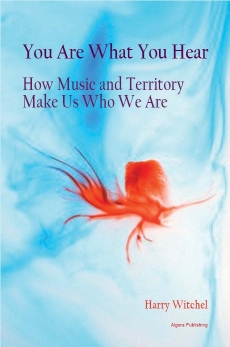Editors - What's new and different about this book
Music Lovers - What does this book tell you about music
Territory. Everyone, not just scientists, accepts that music has a fundamental role is establishing territory — in songbirds, whales and a host of nonhuman species. But so far not in humans. The idea seems to have been passed over academically. It has never been investigated in a full length book. The ramifications of music being related to social territory in human beings are enormous. It unravels a wealth of mysteries we see in everyday human musical behaviours. Territory explains not only military music and church music, but enigmas as divergent as why music raises IQ scores and why music therapy works the way it does. The novel idea in this book that allows this quantum leap in our understanding of music is that:
Territory is not a place — it is a state of mind. While many scientists have been studying territory for nearly a century, the concept of territory has been downgraded to an inconsequential, rare behaviour (in all animals, not just human beings) because the main measure of territory has been limited to “defence events”. Dr. Witchel, who is well-known as a body language expert, has related territory to “territoriality” — a concept appropriated from human nonverbal communication. Territorial behaviours within nonverbal communication are more subtle and pervasive than defence and physical violence; they are based on marking, displays, and gathering. These activities create the mental states such as confidence needed for defence, but they go far beyond defence. Nonverbal territorial behaviour not only marks out land, but it describes how people create a bubble of personal space around themselves and how they communicate “ownership” of their sexual partners by touching them in public. Although virtually all music scientists now accept that music evolved as part of communication, no previous work has meaningfully connected human music with territoriality and body language.
Sophistication. Almost all authors on the science of music state the importance of sophistication in music and in taste, but scientists have never defined sophistication, let alone described all its myriad ramifications. Rather than simply allude to sophistication as a by-word for being educated, superior and desirable, Dr Witchel uses very specific and objectively quantifiable criteria to explain what makes music sophisticated — and to explain why some people have sophisticated tastes, and why others are not likely to. The ramifications of sophistication are that there will never be one piece of music that is perfect for all of humanity, nor can there be one perfect musical style or genre, and that — despite his prediction that “one day milkmen will whistle my tunes” — the musical works of Arthur Schoenberg will never be mainstream in their popularity. No previous author has given a clear, logical explanation of how sophistication actually works.
Synthesizing the cognitivist and emotivist interpretations of music. Obviously music makes us feel emotions, but philosophers of music have argued cogently that music does not make us feel emotions directly (emotivism). Instead some claim that music stirs up cognitive associations, which we subconsciously interpret as being particular emotions elicited by the music (cognitivism). By explaining how context controls the way we relate to music, You Are What You Hear shows how we can divide up our musical experiences into everyday experiences with a primarily territorial function (cognitivist moments), plus sporadic highly emotional musical experiences, during which our emotions are greatly heightened by music (emotivist moments).
Why we listen to sad music willingly. Instead of sad music making us genuinely sad, most of the time it functions in a territorial way to make us feel “better”, even if it does not make us feel “happy” in a cheerful way. By synthesizing the cogntivist and emotivist interpretations of music, an elegant solution is proposed for this long-standing artistic issue in the philosophy of music.
It is in all cultures and all parts of the world. What purpose does music serve? And if we need it, what does it do to us? You Are What You Hear provides the answers to all these questions with the most up-to-date science and humorous anecdotes from the history of pop culture, revealing why music makes us feel so good — or why the wrong music makes us feel so bad.
But this book goes further. Dr Witchel, who researches music, pleasure and the brain, suggests that we evolved music for the same reason as birds and gibbons. We use music to establish social territory. In this way music can influence what you think, what you decide to buy, and even how smart you are. Music stirs such powerful emotions in us because territory is not a place — it is a state of mind.
The book explores, in a way never previously done, the human relationship with music and how music makes us who we are. Part science, part fun, the book is as suitable for the casual reader as it is for students, culture mavens, researchers, and musicians. It is a fast and engaging read where each chapter teases apart a simple but deep enigma.
- Why do we listen to music?
- Why does music make sex better?
- Why do some people love Beethoven and others rap music?
- Is musical taste 100% nurture, or is there a role for nature?
- Why do aggressive young men blare out booming music from their cars?
- Why do people listen to sad music?
- Does listening to violent music make you violent?
- Does listening to Mozart make you smarter or just happier?
- Can learning music enhance your brain?
- Can music secretly influence what we decide to buy in shops?
- Can music cure?
- The Power of Music
|

